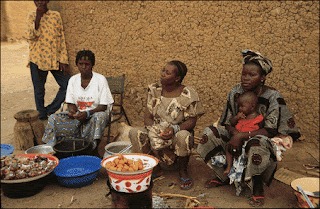Start Your Day Right with Traditional African Breakfasts Across the Continent
Traditional African Breakfasts: A Delicious Journey Through the Continent’s Morning Meals
 |
| South African breakfast bread |
Breakfast Through the Ages: Traditional African Morning Meals for Early Risers
As the sun rises, there's nothing quite like the rich aromas of traditional African breakfasts to kickstart your day. For early risers looking to explore breakfast through the ages, African morning meals offer a fascinating glimpse into the continent’s diverse cultures and agricultural history. From North to South, these breakfasts are more than just food — they’re a sensory journey, deeply tied to the region’s cultural identity.
 |
| North Africa Bread |
North Africa: Bread, Grains, and Aromatic Teas
North African breakfasts evoke the sophistication of Arab cultures. Egyptian bread (aish baladi), with its nutty flavor and ancient origins, pairs perfectly with ful medames, a creamy fava bean dish, or a drizzle of golden honey. Alongside this, Moroccan khobz, a round, thick, and slightly chewy bread, is often served at breakfast tables, perfect for dipping into olive oil or paired with honey and jam. In Algeria, mellah bread, a soft, slightly sweet variety, is commonly enjoyed with fresh butter or a piece of cheese. Another popular bread in the region is Tunisian baklava-style brik, often enjoyed for breakfast with eggs wrapped inside a flaky pastry.
Shakshuka, a delectable African breakfast dish hailing from North Africa, particularly Tunisia, it has captured the hearts and palates of egg enthusiasts worldwide.
In Morocco and Algeria, mornings are filled with the fragrance of green tea infused with fresh mint, blending with the sweetness of dates. This tradition showcases the deep connection between food and the region’s agricultural legacy, inviting early risers to experience authentic North African breakfast rituals.
 |
| Egg on Egyptian bread |
West Africa: Porridges and Hearty Snacks
Start your morning in West Africa with hearty porridges like pap, a fermented millet or cornmeal dish. Known as akamu in Nigeria and koko in Ghana, it’s served warm and either sweetened with sugar and milk or spiced for a savory twist. For a flavorful snack, enjoy akara, crispy bean cakes enjoyed alongside the morning hustle. These foods are more than sustenance; they are a celebration of community and the rich culinary heritage of West Africa.
 |
| Coffee and Traditional Breads |
East Africa: Coffee, Tea, and Traditional Breads
In East Africa, mornings are a vibrant mix of bold flavors and cultural traditions. Ethiopian flatbread (injera), often sweetened with honey, provides a filling start to the day. Along the Swahili coast, the aroma of Swahili chai—a spiced blend of cardamom, ginger, and cinnamon—fills the air, offering a sensory experience that speaks to the region’s rich history as a crossroads of trade and culture. For early risers, these East African breakfasts offer a perfect fusion of nourishment and tradition. |
| Traditional African Breakfast |
Central African breakfasts focus on energy-boosting meals that sustain the body throughout the day. Boiled plantains topped with rich groundnut sauce or cassava-based dishes like porridge or steamed leaves provide the perfect balance of nutrition and flavor. These meals honor the enduring connection between agriculture and community, providing energy to fuel the day’s work and further cementing the importance of traditional foods in the region.
 |
| Southern African Meal |
Southern Africa boasts a blend of indigenous flavors and colonial influences. A steaming bowl of mealie pap, a maize porridge, is commonly served with butter, sugar, or even savory meat stews. Pair it with a warm cup of tea and rusks, a beloved colonial-era snack now enjoyed as part of daily life. These Southern African breakfasts reflect a region adaptable to change, where indigenous and colonial food traditions coexist.
 |
| Family eating together in Mali |
The Cultural Significance of African Breakfasts
African breakfasts do more than nourish the body; they foster community bonds. Shared meals like tea and street food enhance social connections, while locally sourced ingredients such as millet, cassava, and maize showcase the region’s commitment to sustainability. The influence of global trade brings spices and preparation techniques that enrich breakfast traditions, creating a blend of flavors that tell a unique culinary story.
 |
| Starbucks in Morocco |
Modern Breakfast Trends in Africa
As globalization and urbanization reshape lifestyles, modern African breakfasts are evolving. Fast-paced living has led to the popularity of pastries, bread, and coffee in urban centers, while international chains like McDonald's, KFC, and local favorites such as Chicken Republic now offer breakfast options like egg sandwiches, fried doughnuts, and spiced coffee. Supermarkets and bakeries cater to on-the-go consumers, though this shift often replaces traditional meals with quick and convenient alternatives.
 |
| Africa’s breakfast history is changing |
Changing Breakfast Traditions Due to Aid
In regions affected by economic hardship, food aid has altered traditional breakfast patterns. Fortified porridge and powdered milk have become staples in many households, and subsidized wheat and maize are replacing traditional grains like millet and sorghum. School feeding programs, though designed to fight hunger, often provide energy-dense yet nutritionally limited options that impact younger generations’ food expectations.
 |
| Modern Morning Meals |
A Story of Strength, Adaptation, and Cultural Pride
Each African breakfast tells a story of strength, adaptation, and cultural pride. From the rich, spiced teas of East Africa to the street-side akara of West Africa, these morning meals reflect the continent’s vibrant culinary history. While global trends influence breakfast habits, traditional flavors continue to thrive, evolving and adapting to modern life. Whether you’re enjoying a hearty breakfast at a community market or grabbing a quick bite from a bakery, African breakfasts remain a powerful symbol of connection to both culture and community.




